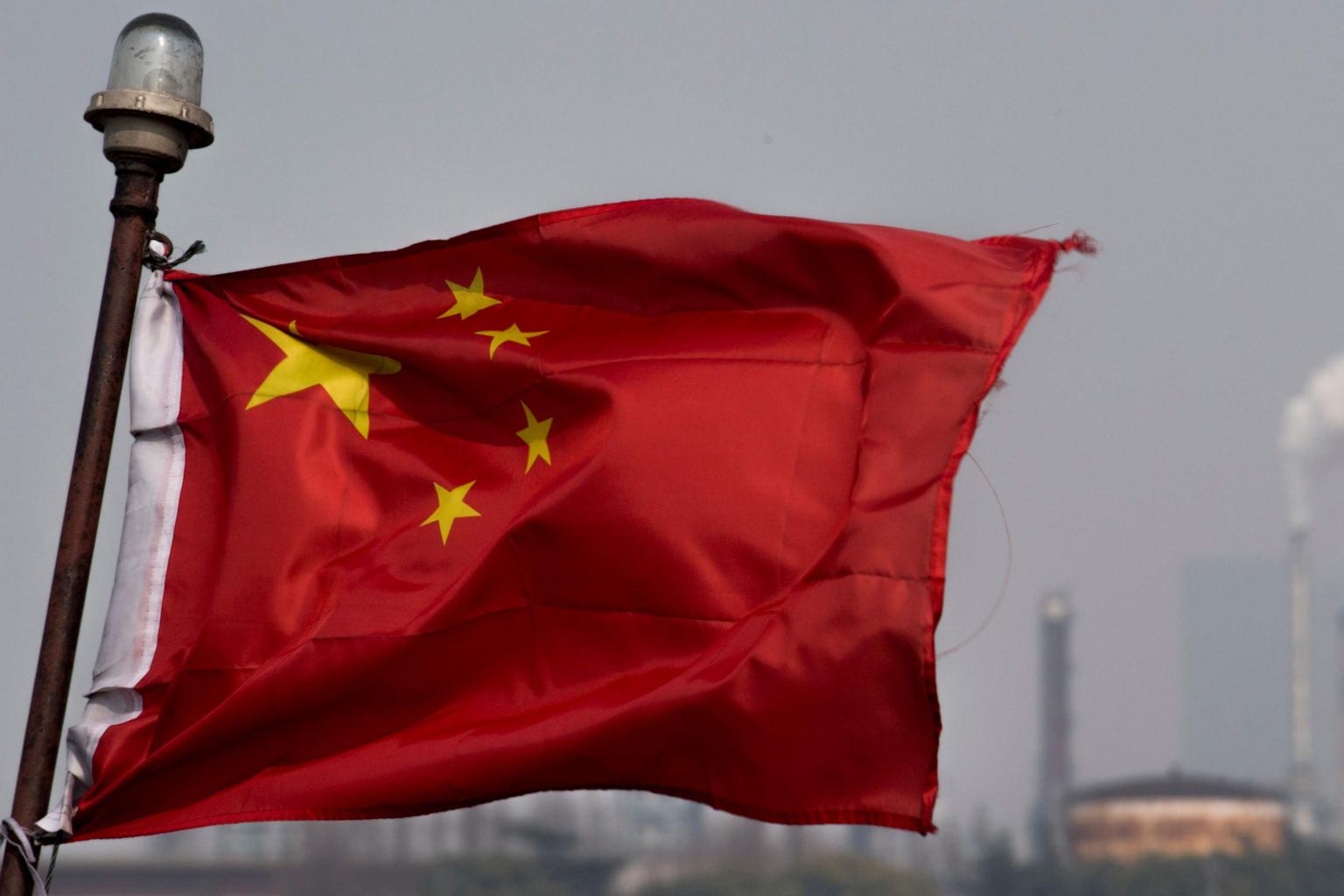The bluff on China: Inquirer
In its editorial, the paper urges the ruling administration to be more courageous when dealing with China.
Sign up now: Get insights on Asia's fast-moving developments

A Chinese flag fluttering in front an oil refinery in Shanghai, on March 22, 2018.
PHOTO: AFP
MANILA (PHILIPPINE DAILY INQUIRER/ASIA NEWS NETWORK) - On Wednesday, at the hearing of the congressional special committee on the West Philippine Sea, Foreign Secretary Alan Peter Cayetano faced question after question about the weak Philippine response to Chinese provocation in the South China Sea.
He forcefully denied that the response was weak, and also made an incredible claim - that the Department of Foreign Affairs (DFA) has filed many diplomatic protests against China: "Several dozens, maybe 50, 100 - I'll have to count it - over the past two years."
This sounds like the idea just occurred to the smooth-talking former campaign spokesperson and senator.
He could not even give an exact number, yet another sign that this country's foreign policy is being implemented on the fly.
But the main reason why Cayetano's astounding claim that the DFA had taken diplomatic action against China dozens of times is specious lies in his own, special, nontextbook definition of "diplomatic protest" - "When we file a note verbale, that's a protest …. If we list down everything, that's a protest. If we list down 10 things, then we 'protest' 10 things. It's the content. If I get the microphone and I say, 'China, what you're doing is wrong,'that's a protest."
Only the first counts as diplomatic protest.
Cayetano wants Filipinos to believe that by merely making a list of grievances and including the agenda in a negotiation, the DFA is already filing as many diplomatic protests as there are grievances.
This is nonsense.
Yes, it is some kind of diplomatic action, in the same way that the foreign secretary picking up a microphone and telling off China is a form of statement - but Cayetano is fudging the truth when he describes all of these as the kind of diplomatic protest that the critics of the administration's South China Sea policy look for.
And claiming that an alleged list of 10 "things" is counted, not as one list, raised in one bilateral meeting, but as 10 "things," is an obvious attempt at inflating one's record.
It is such a brazen bluff, completely lacking in dignity.
One measure of how inadequate both his explanation and his China policy are is to use his own set of criteria.
At the hearing, he described the Duterte administration's approach to sweeping Chinese claims to almost the entirety of the South China Sea as "prudent, patient and pragmatic."
It was, he said, nothing less and nothing more than the "traditional building of trust through diplomacy."
But in fact there is nothing traditional in the country's current approach to the South China Sea issue.
In the first place, Cayetano speaks of the building of trust between the Philippines and China - but he did not recognise or acknowledge that the "soft landing" the country offered China when the arbitral tribunal award was issued on July 12, 2016, and the administration's refusal to force the implementation of the landmark legal victory, had in fact eroded the trust of other members of the international community in the Philippines.
It is an open secret that key members of Asean have been confounded by Manila's turnabout since the arbitral tribunal ruling came down; it is common knowledge that administration officials' statements passing on all responsibility for freedom of navigation operations and other such initiatives to the United States have ruffled feathers not only in Washington but also in Canberra and Tokyo.
This notion that Cayetano insisted on at the hearing, then, that the focus was on building trust, applies, if it does apply, only to Philippine-China relations.
Everyone else can go hang.
Secondly, Cayetano's idea of diplomatic leverage was inexplicably borrowed from basketball lore: He said our advantage against China was that we have "puso," (or heart) a reference to the national basketball team's battle cry.
But in fact the criticism against Cayetano and the Duterte administration's approach to China is that it does not have heart; it does not have even the courage to call China's policy for the provocation it actually is.
His invocation of "puso" is embarrassing proof that, when it comes to China, this administration is weakness itself.
The Philippine Daily Inquirer is a member of The Straits Times media partner Asia News Network, an alliance of 23 news media entities.


